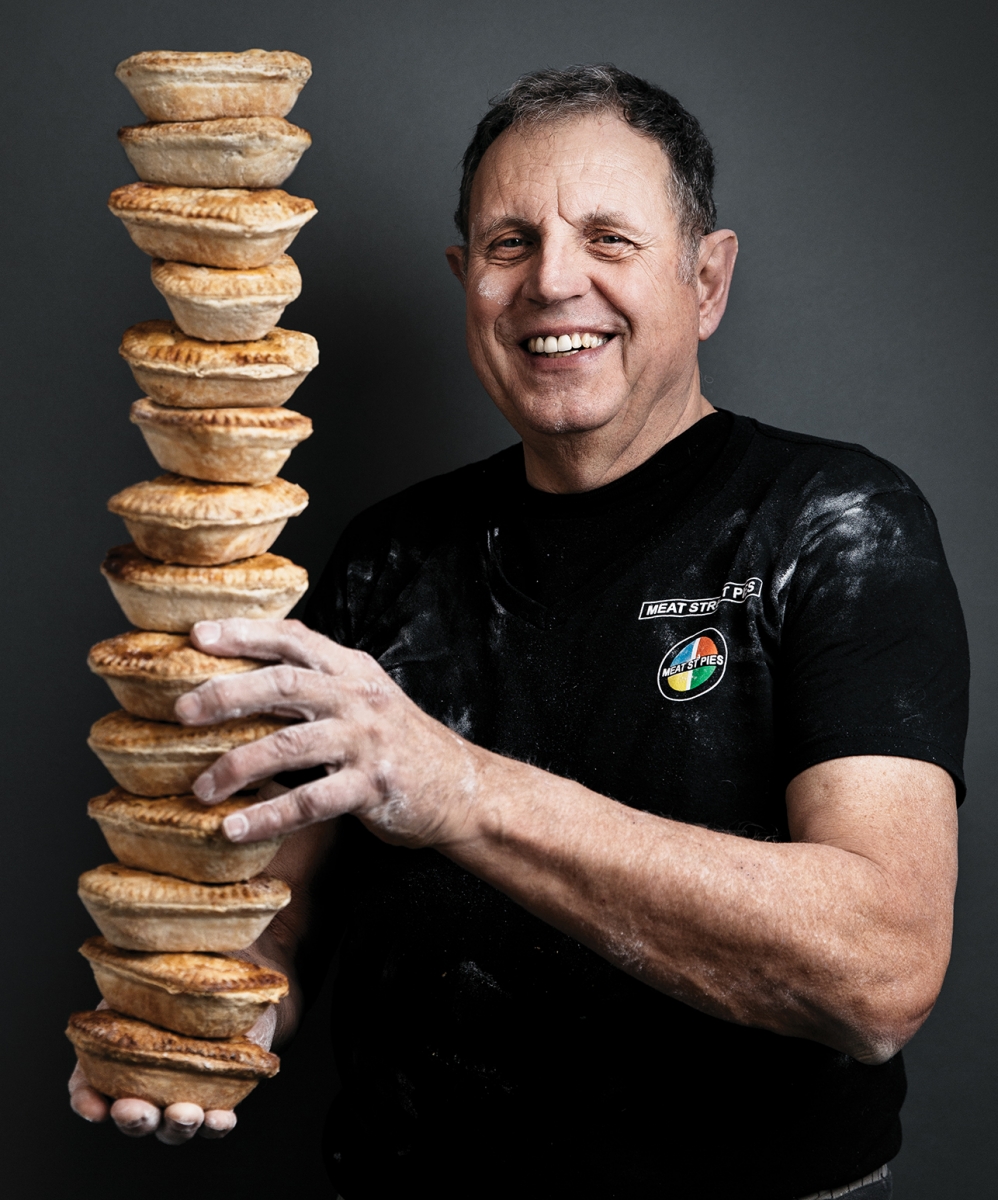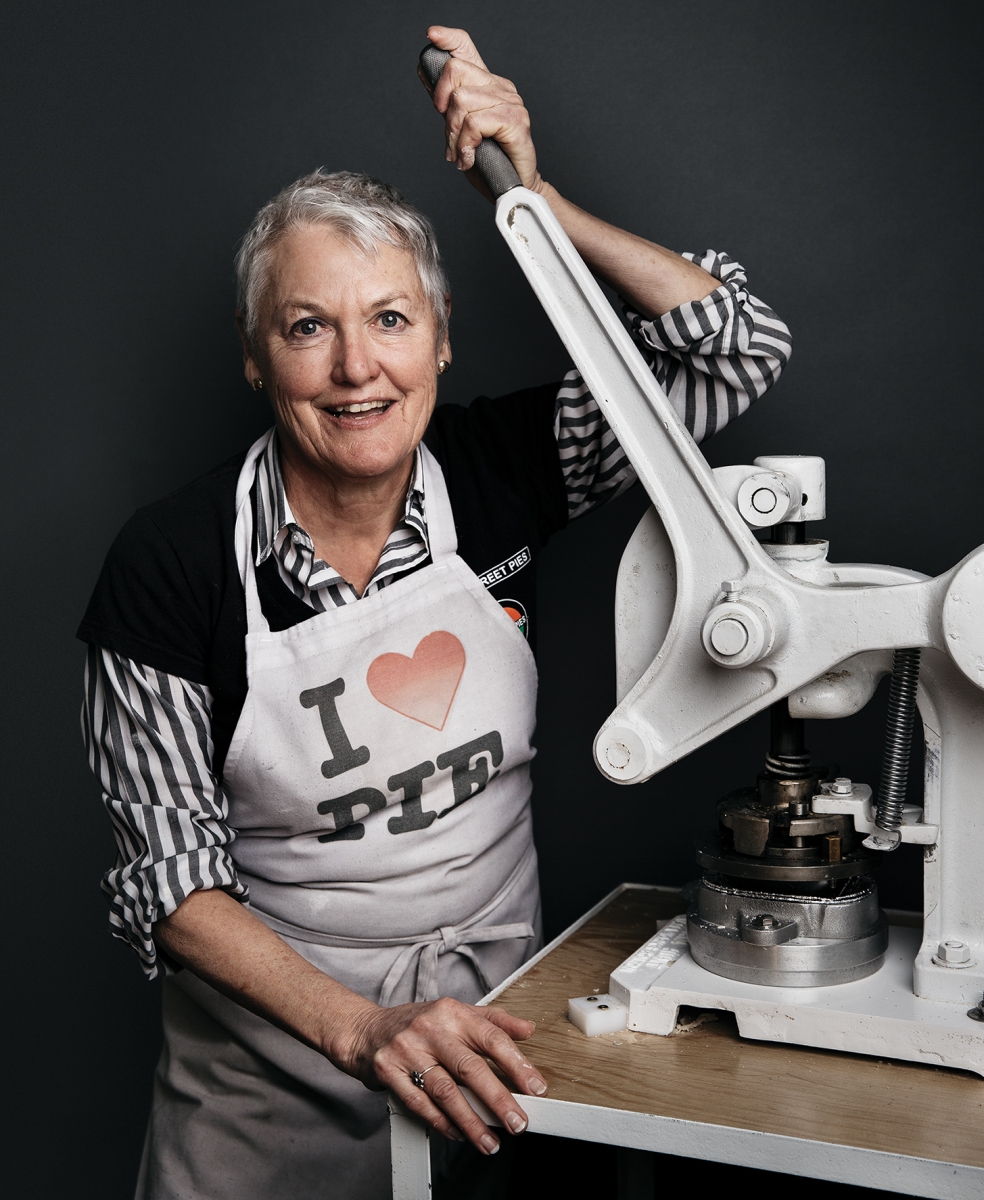
The lights dim. As Elope Theatre’s performance of Sweeney Todd begins, a shuddersome disembodied voice booms from the speakers overhead. “Please turn off your cellphones,” it says. “Someone forgot to turn theirs off last night. On a completely unrelated note, how were the meat pies?”
The aforementioned pies are those Jonathan Avis is selling from his food truck, Meat Street Pies. Only Avis would see a marketing opportunity in a story where dead bodies are ground into meat pies. Outside Edmonton’s Westbury Theatre in May 2017, during the run of the show, he and his wife, Thea, sold The Judge (steak and kidney), The Priest (heavenly Cornish) and The Lawyer (the most expensive: Steak and cheese). The menu is unusual, but the large lineup isn’t. Now in its third year, sales have increased 50 per cent year-over-year, and the food truck is a hit at farmers’ markets and among clients like CP and the Edmonton Oilers.
At first glance, Meat Street Pies looks like a quaint success story: An untapped food category, slyly marketed and deftly run by a couple of industrious sexagenarians. But, as in Sweeney Todd, there’s a story behind these pies.
In the harbour of balmy Puerto Escondido, Mexico, Avis lines a 50-gallon oil drum with firebrick, installs a chimney on one end and cooks Neapolitan pizzas over crackling Baja mesquite. Four decades creating food products have brought him – a towering, lanky Brit with a permanent open-mouth smile – to this one. Nothing’s momentous about this product, though. It won’t help him reach $20 million in sales, it’ll win him no awards of excellence. It’s a meek slice of margherita, which he’ll sell to raise money for the boating club he commandeers. Avis speaks scant Spanish, but an aphorism catches his ear: A falta de pan, buenas son tortas. With nothing better, this will do.
Avis’s pizza, thankfully, looks like it’ll be a hit; he and Thea, two expats among many in the harbour, could use one. It’s March 2013, what feels like a blink since the most tumultuous episode of their lives. Their boat, Zwerver II – Dutch for “the wanderer,” referencing either the couple’s itinerancy or Avis’s style of conversation – is all they have left. They used to run a thriving dessert manufacturer in Edmonton called Saxby Foods, whose tarts and cakes stocked the shelves of Safeways, Save-Ons and other grocery chains across North America. But after a whirlwind of misfortune, Saxby went bankrupt. Jonathan and Thea did too, losing their home and everything else. At 65, Avis was prime for retirement, but suddenly the denouement of his distinguished career was over. He couldn’t even apply for a credit card. Zwerver II was seized; their son took out a loan to buy the 48-foot steel ketch back from a creditor. They set sail for the Sea of Cortez, perhaps for good, with nothing – nothing, that is, but the skills that led him to food products in the first place. Marvelling at his ersatz bell oven, it strikes him: “I designed it, I engineered it, I built it – I even welded the damn thing,” Avis says. “Then I made the food and marketed the product.” Even 4,000 kilometres from Edmonton, under an iridescent sunset that could blot out any drifter’s distant life, he couldn’t escape the food industry. “I’m back.” That’s how his next product began.

As a child in Bournemouth, a city in England that faces the English Channel, Avis served sausages and eggs to patrons of his parents’ seaside bed and breakfast. A cantankerous kid, he was the family radical with a propensity for risk. When he was 10, his school held a baking competition sponsored by McDougall Flour. His mother, Joan, taught him how to make cupcakes. “I want to see results, and she was like that too,” Avis says. He won. The game was on.
After studying to become a chef, in 1966 Avis immigrated to Canada. He met Thea, an exuberant and free-spirited travel agent, scuba diving in Toronto and, in 1972, they married. They moved to Vancouver and, with an interest in buying a business, Avis took over a floundering bakery called Mr. French Pastry in 1976. He renamed it Oscarsson’s, and six months after saving it from insolvency it expanded to eight stores. Avis spun off the Gourmet Baker management company, which oversaw a host of subsidiaries he ran. Starting in 1990, Gourmet Baker changed hands between Ogilvie Flour, Labatt and Robin Hood Multifoods. When Robin Hood bought it from Labatt, GourmetBaker had yearly sales of $50 million. Thea explains this epoch with a metaphor, a 1928 rumrunner boat they restored: “Everything we touched back then was bankrupt, and we turned it all around,” she says.
Avis concurs. “I was kicking ass,” he says, grinning with his wry English delivery. “I knew my game.”
At the time, Llewellyn Smith – the heir of the famous E.D. Smith jam company – was eyeing Gourmet Baker’s product line, and soon they merged their frozen-foods businesses. Smith says his company stabilized Avis’ penchant for risk. “He successfully grew the business and developed new products, and it was quite fun to learn from his style,” Smith says. “Jonathan sees what’s ahead and says, ‘Damn the torpedoes!’ He’s not one to sit back and plan – he’ll just take the hill.”

Soon, however, Gourmet Baker was sold to Robin Hood and Avis was made vice-president of its North American bakeries. He excelled at turning around acquisitions that were losing money, but vehemently opposed the company’s direction. “I told them they were full of shit,” Avis says, “and they fired me.”
He was 46 years old with money. He and Thea moved to Edmonton and bought a retired 25,000-square-foot meat-cutting plant, which became Saxby. Soon it produced Costco’s cheesecakes and sold to Albertson’s, the United States’ second-largest grocer. In 2004, with $20 million in revenue, the company received the Agri-Food Award of Excellence for Export from the Canadian government. In prior posts, Jonathan wanted to compete with Sara Lee, which dominated the market. Now, Saxby produced a dozen of its products.
Avis’s temerity paid off. Danny Turner, who founded the fresh-food delivery service Organic Box, was thrilled that Saxby produced organic milk when no one else would. Saxby scored a contract with Safeway, which “broke the industry open,” according to Turner. “By doing private label, he showed the grocery market the demand was there. He took a leap of faith when he could have retrenched.”
But in 2008-09, Saxby lost a third of its business as retailers switched to American products. Avis diversified, but the rising dollar sapped his exports. Grocers wanted higher margins without raising prices. Amid high oil prices, labour costs ballooned. His bank wouldn’t refinance.
The final nail in the coffin: Agriculture Financial Services Corporation (AFSC), a Crown corporation, had provided equity for Saxby to enter the organic milk business. With further help from a Canadian Cattleman’s Association (CCA) grant, Saxby was tracking to meet Safeway’s volume. But it had to restructure its working capital, and an equity injector, a Hutterite colony, abruptly backed out of the deal. Losing confidence, AFSC walked, too. The equity Avis raised suddenly became debt. He had a contract; he’d raised the money; his business, nevertheless, was whisked from beneath him in a perfect storm he couldn’t ride.
“There were moments when I questioned my own sanity and my ability to turn things around,” he says. “I’ve turned around companies all my life, so why not this one?'”
On January 24, 2012, employees were still packing milk when PwC, the receiver, changed the locks. After 18 years in business, Saxby was bankrupt, taking Jonathan and Thea’s house and boat, and a cool $1 million, down with it. Adios, vaya con dios. In a converted garage behind the house where Jonathan and Thea currently live with their daughter, Meghan, there’s a preparation area full of equipment for meat fillings and pastries. On the wall hangs a photo of a semi-truck and trailer, a maroon ribbon emblazoned across its side – the Saxby logo.
“Try this,” Jonathan says to me, handing over a warm shepherd’s pie. “You want a nice ratio of meat, sauce, vegetables and potatoes. A spike of pepper. It’s a medley of flavours that give you a feeling of…” he pauses. “Of something special.”
Recalling Puerto Escondido, Jonathan says he considered opening a pizzeria or a bakery in Loreto, the harbour’s closest town. They were prepared to make Puerto Escondido their home and live on their boat. “It’d take my mind off Saxby,” he says. “But I had to find myself. I was a beaten person.”
Living off a few income streams the bank couldn’t touch, about $1,300 a month, they fixed boats or went fishing for sea bass and amberjacks. Jonathan and Thea lived on Zwerver II in the winter and their children’s basements in the summer. They shopped at thrift stores and cut each other’s hair. Without money to live back home, they prepared to become Mexican citizens. Unable to shake old accounting habits, Jonathan calculated the costs to live there for the rest of their lives. He gave himself 15 years.
In his corporate life, Avis was never content where he was. He needed movement. (When Saxby finally hit $20 million in sales in 2003, Jonathan groveled that they were two years behind his benchmark.) He took odd jobs installing drywall and replacing windows and doors, but the pay was paltry. Now, with time to think, Avis’s mind drifted to his childhood in England, and to the one that got away.
The meat pie, of course, was like his mother made. He’d wanted to sell meat pies through Saxby, but never did. Even the name Saxby was borrowed from a defunct meat pie manufacturer in England. Now was his opportunity – it was that or sailing around the world. The question was how to do it on a pensioner’s budget.
Then, while Jonathan and Thea were in Mexico, his mother passed away. Joan left him more money than he’d anticipated, which they used to buy the house and industrial garage. Then they found a relatively, “decently cheap” food truck for $40,000 from an old Saxby acquaintance, gutted it and installed an oven.
Food trucks, typically territory of the young and hip, are rarely run by retirees. But to Jonathan it was more than a storefront on wheels; it could be a marketing device for a wholesale brand. It could be franchisable. Unlike sandwiches, meat pies required little preparation. His family told him he was crazy to go into food again, but he had enough confidence in his skill set to know he’d make a marketable product. “And it was obvious it had to be pies,” he says.
In 2014 they sailed to Mexico again, only to find the pull back to their family was stronger than ever. Canada would always be home. “When you have nothing more to lose, you realize what’s important to you,” Jonathan says. “Health, happiness and family.” The next summer, with Jonathan at 67 years old, Meat Street Pies was born. Jonathan’s father, a Cambridge-educated engineer, once told him that if you understand the principles behind something, you can reconstruct it. With his stately corporate career behind him, relying solely on his acumen, he prayed his father was right.
“Mmm,” Jonathan murmurs, pie crumbling onto his plate. “Isn’t that the best pie you’ve ever had?”
Jorel Pepin, who owns Block 1912, found Meat Street Pies while looking at products for his second coffee shop, Monument Coffee Bar, since sold to investors. For all food decisions, Pepin enlist Eric Hanson, a Gold Medal Plates-winning chef. Hanson said Pepin had to try the food truck. “I’ve run an award- winning bakery for 11 years, so I have a deep appreciation for attention to detail and experience, but the work they’ve done takes the cake,” Pepin says. “Our first meeting ran two hours and four meat pies longer than we’d anticipated.”
Trace elements of Jonathan’s corporate life remain. His ambition is sky high; he wants his wholesale product in 7-11, and currently wholesales at Acme Meats, Ocean Odyssey Inland, Sir Winston’s Fish and Chips and Real Deal Meats. He’s always wondering what’s next, and he’s even training a protg, Andrew Rachinski. “At my age, I don’t have much of an ego,” he says. “What I have is knowledge, and you don’t want to die taking that with you.” Not that he’s worried about that, of course, or that he’s noticed those 15 years have dwindled down to 10.
As Zwerver II embarks again for the Sea of Cortez, the wind is at their back. Every product has a lifecycle, Jonathan says, knowing his own life has been defined by one product’s lifecycle after another, or that somewhere along the line his products’ lifecycles became inextricable from his own. Jonathan and Thea’s life has come full circle – they’re back in the thick of the food business – but is at once unrecognizable from the one they planned. A falta de pan, buenas son tortas. Anchors aweigh; the water awaits.
Like this content? Get more delivered right to your inbox with Ed. Eats
A list of what’s delicious, delectable and delightful.









